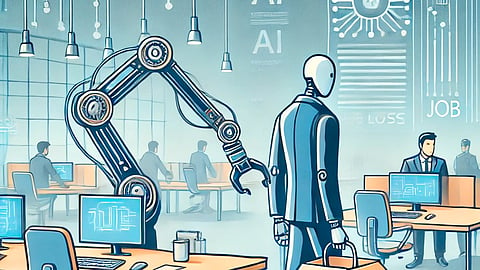
- NEWS
- the EDIT
- COMMENTARY
- BUSINESS
- LIFE
- SHOW
- ACTION
- GLOBAL GOALS
- SNAPS
- DYARYO TIRADA
- MORE

The country opened September with a call that goes beyond fascination with artificial intelligence. For the 2025 Development Policy Research Month (DPRM), experts stressed that no matter how powerful new technologies become, the Philippines must first build policies strong enough to protect its people.
“Policy research provides the guardrails that help governments adopt technology responsibly,” said Philippine Institute for Development Studies (PIDS) President Dr. Philip Arnold Tuano during the launch of this year’s DPRM. Without such guardrails, he cautioned, the benefits of AI may never outweigh the risks.
Established under Proclamation 247 in 2002, DPRM places policy research at the center of development strategy, reminding government agencies, lawmakers, and the public that evidence-based planning is the only path toward lasting solutions.
This year’s theme, “Reimagining Governance in the Age of AI,” underscores a dual reality. On one hand, artificial intelligence offers new possibilities for efficiency, transparency, and citizen engagement. On the other, unchecked adoption can widen inequality through digital exclusion, embed bias in decision-making, expose institutions to cybersecurity threats, and displace workers in industries unprepared for automation.
The opening activities made clear that the Philippines cannot treat AI as a magic bullet. Instead, it must be seen as a tool that only works if guided by clear principles and robust governance. From digital literacy programs to ethical safeguards, the challenge lies not in deploying AI but in making sure no one is left behind.
This concern is shared across sectors. The Development Policy Research Month Steering Committee brings together the Bangko Sentral ng Pilipinas, the Civil Service Commission, the Department of Budget and Management, the Department of the Interior and Local Government, the Department of Economy, Planning, and Development, the House and Senate policy research offices, the Philippine Information Agency, and the Presidential Management Staff. For 2025, the Department of Science and Technology joined the lineup, reflecting its critical role in AI research and oversight.
The highlight of the month-long campaign is the 11th Annual Public Policy Conference (APPC) on September 18 at the New World Hotel in Makati. Policymakers, academics, civil society groups, and international experts will convene to examine how AI is being applied in three critical areas: energy management, anti-corruption initiatives, and governance of aging populations.
The APPC aims to move discussions beyond theory, offering practical pathways where AI can support development without eroding rights or trust. For instance, AI-driven monitoring tools could help detect corruption, but without transparency mechanisms in place, the same technology could enable surveillance overreach.
Beyond Metro Manila, local governments and partner agencies will roll out their own activities to bring the conversation closer to communities. Seminars, media briefings, and roundtable discussions will amplify the message that AI policy is not just a tech issue but a governance challenge that affects ordinary Filipinos.
